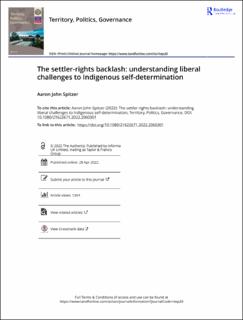The settler-rights backlash: understanding liberal challenges to Indigenous self-determination
Journal article, Peer reviewed
Published version

Åpne
Permanent lenke
https://hdl.handle.net/11250/3061199Utgivelsesdato
2022Metadata
Vis full innførselSamlinger
Sammendrag
In the archetypal settler-colonial states of the United States, Canada, Australia and New Zealand, Indigenous peoples have joined the ‘rights revolution’, pressing for self-determination. They have been met by a ‘settler-rights backlash’, contraposing settler and Indigenous rights. This article makes two contributions. First, it presents a scoping study of settler-rights challenges in Anglo-settler states, revealing the extent and means of the settler backlash. Second, working within mainstream Anglo-settler political theory, it theorizes settler-rights challenges, exploring what liberal principles settlers invoke, what Indigenous protections they impugn, and what contrapositions of rights ensue. This article shows settlers invoke the liberal principle of universalism to impugn Indigenous sovereignty, the liberal principle of individualism to impugn differentiated citizenship, and the liberal principle of egalitarianism to impugn Indigenous decision-making and territorial control. In doing so, this article reveals the normative dynamics and internal contradictions of settler-rights challenges. By showing the extent, dynamics and contradictions of such challenges, it is hoped to help public decision-makers better understand and resolve them.
